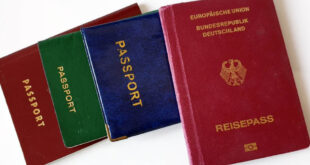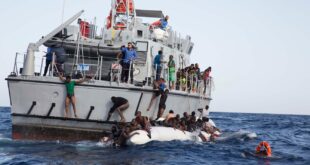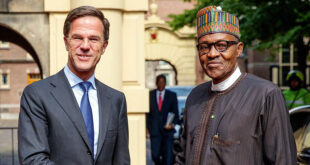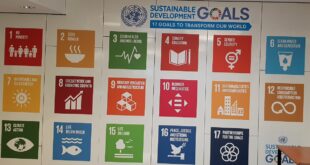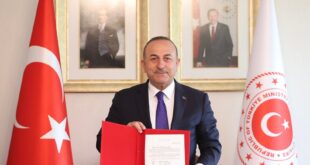Two leading European countries are planning drastic measures to deal with migration from Africa through the Mediterranean. France says it wants to establish camps to vet migrants in Libya, Chad and Niger as Italy plans to deploy war ships to the Libyan coast to stop refugees and send them back.
Italy’s cabinet on Friday (28 July) backed a plan by Prime Minister Paolo Gentiloni to send the country’s navy, comprising war ships, planes, drones and at least 700 sailors, into Libyan territorial waters to stop migrants and send them back. Under international law, migrants intercepted in international waters cannot be sent back to Libya if they face potential violence and persecution.
Announcing the plan, Gentiloni said Italy’s mission would help Libya “reinforce their capacity to control their borders and national territory”, claiming that it had been requested by Libya. However, the UN-backed government in Tripoli has vigorously denied making any such request.
Libyan Prime Minister Fayez Sarraj said his administration had agreed to receive only training and arms from Italy. “Libya’s national sovereignty is a red line that nobody must cross,” he said. The two leaders are scheduled to meet on the issue in Rome on Wednesday.

Serraj and the rival government of General Khalifa Hifter met in France last week and agreed on a ceasefire and possible national elections in the unstable North African country.
Italy, which has received about 92,000 migrants this year, has voiced its frustration of being left alone by other EU member countries to cater for the refugees. Two weeks ago, it announced plans to issue visas to migrants to enable them travel to other countries in the EU to seek asylum.
The naval mission could go before the Italian parliament this week, where it is likely to pass as the issue of migration takes on greater importance ahead of national elections next year.
In a similar development, French President Emmanuel Macron announced last Thursday that his government would establish migrant registration centres or “hotspots” in Libya – and later in Niger and Chad – to vet asylum seekers prior to their attempt to cross into Europe. He said there are currently between 800,000 and a million refugees stranded in Libya, hoping to get into Europe.
According to the French leader, the creation of such “hotspots” would stop people not eligible for asylum from “taking crazy risks”, which he said was fuelling the rise in people smugglers, and thus funding terrorism.
Observers say Macron’s plan is a sign that France has had enough of seeing migrants sleeping rough on its streets. And critics of establishing camps in Libya have pointed out that the country was still in a state of war with three different governments laying claim to sole legitimacy. Moreover, migrants in the North African country have been subjected to massive human rights abuses, including torture, rape, forced labour, beatings and other violations, by people smugglers and Libya’s security officials.

The Italian government recognizes this fact and wants international organizations like the UN to help migrants return to Libya and ensure proper treatment before repatriation to their home countries. Critics doubt the effectiveness of the UN in ensuring that the human rights of migrants are respected in Libya.
Analysts say that if the Italian and French measures, which have received the support of several other EU member states, are implemented, the Mediterranean route would be effectively blocked for migrants fleeing persecution and wars in Africa and the Middle East. Migrants would be effectively trapped in Libya.
The United Nations says that more than 110,000 migrants have made the dangerous journey across the Mediterranean to Europe so far this year. It estimates that more than 2,300 people have drowned or are missing.
Femi Awoniyi
 THE AFRICAN COURIER. Reporting Africa and its Diaspora! The African Courier is an international magazine published in Germany to report on Africa and the Diaspora African experience. The first issue of the bimonthly magazine appeared on the newsstands on 15 February 1998. The African Courier is a communication forum for European-African political, economic and cultural exchanges, and a voice for Africa in Europe.
THE AFRICAN COURIER. Reporting Africa and its Diaspora! The African Courier is an international magazine published in Germany to report on Africa and the Diaspora African experience. The first issue of the bimonthly magazine appeared on the newsstands on 15 February 1998. The African Courier is a communication forum for European-African political, economic and cultural exchanges, and a voice for Africa in Europe.









